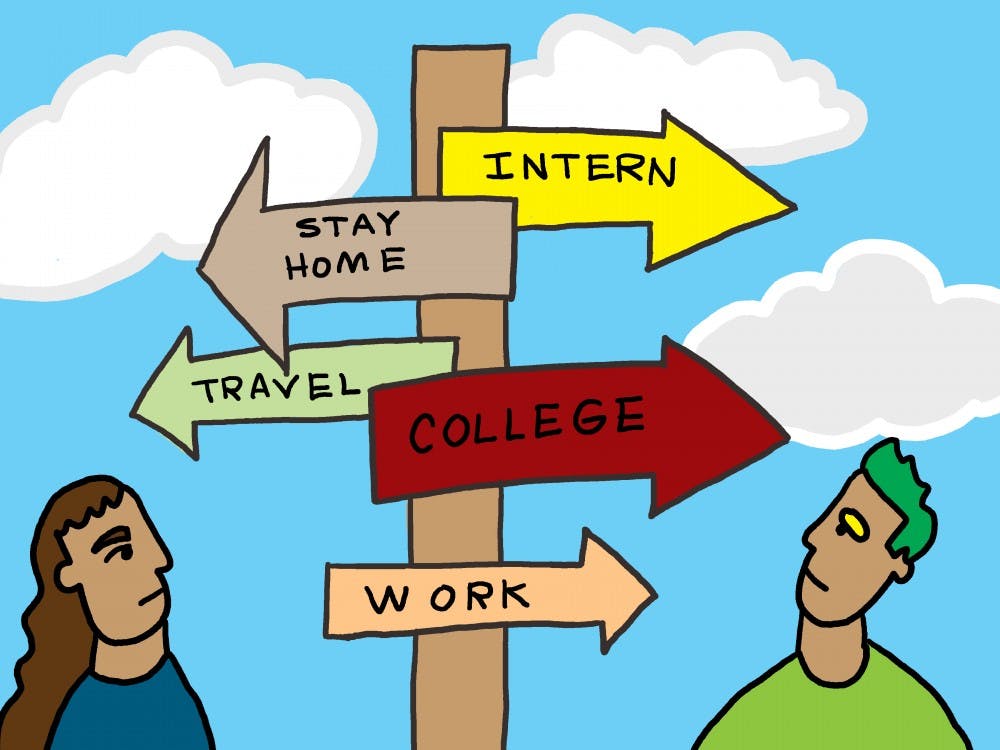For many students, the push to pursue higher education in the form of a four-year university or college is drilled into them by parents, teachers and political figures from a young age.
From a young age, kids are told that obtaining a college degree is the pathway to success.
70 percent of American students will study at a four-year college, but less than two-thirds will graduate.
With a four-year graduation rate of over 45 percent in 2015 at ASU and increasing every year, more and more students are pursuing college degrees.
While obtaining a college degree in a specific topic can increase the chances of students finding jobs and earning higher salaries, there are some drawbacks associated with pursuing a college education.
The average student will spend around four years obtaining an undergraduate degree which involves taking a full course-load of difficult classes. Many students have to work during their time in college to pay bills and other expenses, so that leaves very little room for internships or job experience.
It is a widely known fact that job experience is the number one thing employers look for when hiring new employees, so sometimes, college degrees don’t ensure job security.
However, different fields of study require different levels of education. For example, pursuing a career in the healthcare field requires years of schooling. For students pursuing medical school, four years of undergrad are followed by four years of medical school and then a number of years for residency. However, for someone going into business, this level of education is not required.
Stanley Zucker, a professor at the Mary Lou Fulton Teachers College at ASU believes that pursuing a four year university is not for everyone.
"With the expenses of college rising every year, it's important for students to explore their options and realize that attending a four year university isn't absolutely necessary — there are plenty of great paying jobs out there that involve less time, less money and less stress," Zucker said.
For some people, college is also a bad investment.
The cost of college has risen more than 1,100 percent since 1978 and as the prices continue to go up, it becomes more and more difficult to afford the cost.
Even when adjusted for inflation, this represents a drastic spike in cost. As a result, many individuals struggle to afford college.
Some college degrees don’t guarantee job security, and when you graduate and find yourself struggling to find work, you also have the burden of a boatload of student debt to pay off.
Not everyone is college material as well. Over 54 percent of Americans who enroll in college eventually drop out. College is hard enough as it is for those are motivated and excited to be there, so for people who don’t really want to be there, it is almost impossible.
It’s important to realize that following the strict path from high school to college to the work force is not a viable option for everyone. The time spent in college earning a degree can often be put to better use getting job experience.
There are plenty of jobs out there that do not require a college degree. There are various technical and trade schools that provide training in areas such as automotive care, beauty and cosmetology and travel and hospitality.
For example, Arizona is home to a number trade schools such as the Arizona Culinary Institute, Steiner Institute of Esthetics and Arizona School of Massage Therapy. All schools provide training in specific areas of study that allow students to learn skills and enter the work force immediately.
A four-year college degree is not necessary for many jobs. Plumbers, electricians and wholesale sales representatives make great money and require just a high school diploma.
It’s time to stop looking down upon individuals who choose to pursue vocational and technical education rather than a traditional four year university.
Rising high school seniors should be given the option to enter a program following their graduation that allows them to learn valuable technical skills which will prepare them for particular fields of work.
It’s time relinquish the idea that every young person has to go to college and start offering alternative routes to those who are not interested in pursuing higher education.
Reach the columnist at ymian@asu.edu or follow @yasminemian on Twitter.
Editor’s note: The opinions presented in this column are the author’s and do not imply any endorsement from The State Press or its editors.
Want to join the conversation? Send an email to opiniondesk.statepress@gmail.com. Keep letters under 500 words and be sure to include your university affiliation. Anonymity will not be granted.
Like The State Press on Facebook and follow @statepress on Twitter.




